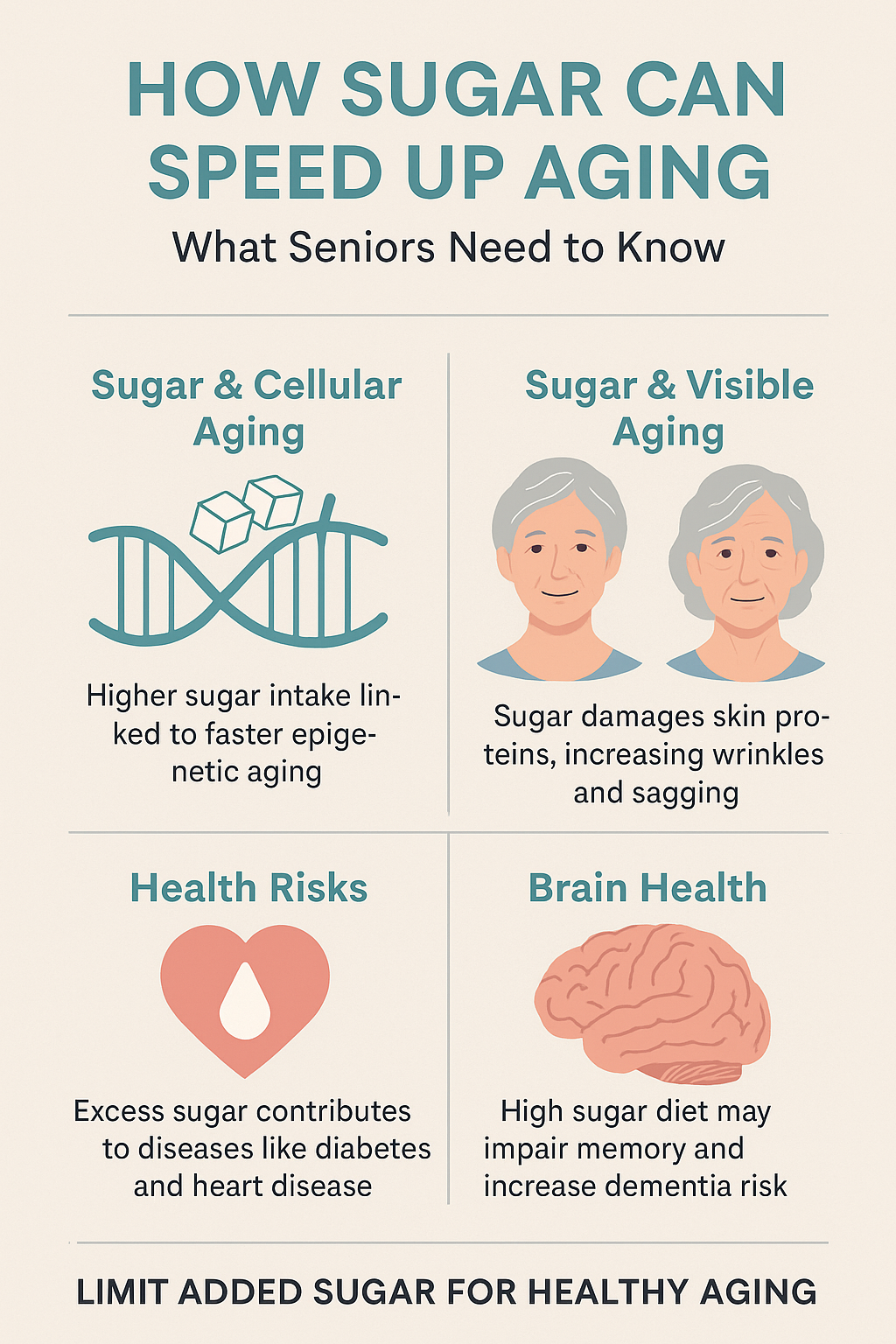🍯 Sweet but Sneaky: How Sugar Can Speed Up Aging (and What Seniors Can Do About It)
Discover how sugar accelerates aging at the cellular and skin level, increases disease risk, and affects memory. Learn practical, senior-friendly tips to reduce sugar and age gracefully.
Bruce R Black
9/1/20253 min read


🍯 Sweet but Sneaky: How Sugar Can Speed Up Aging (and What Seniors Can Do About It)
Introduction: Why Sugar Matters More as We Age
Aging is inevitable—but how quickly and gracefully it happens depends on many factors, including diet. For seniors, one hidden factor stands out: sugar. While it adds sweetness to life, science shows that excess sugar can make our cells, skin, and brains age faster.
Let’s explore the science, the risks, and practical steps you can take to enjoy your golden years with energy, clarity, and vitality.
Sugar and Biological Aging: More Than Just a Sweet Tooth
Think of your body like a clock. There’s your chronological age (your birthdays), and your biological age (how old your cells act). Sugar has a surprising influence on the latter.
A 2024 JAMA Network Open study found that every gram of added sugar was linked to increased biological age.
Cutting just 10 grams a day—the sugar in half a soda—was enough to “turn back” the biological clock by about 2.4 months.
This matters because biological age is a stronger predictor of health, independence, and longevity than the number on your driver’s license.
Sugar and the Skin: Why Wrinkles Love Dessert
Sugar also shows up on the outside—in your skin.
Glycation: Sugar attaches to proteins like collagen and elastin, forming harmful compounds called AGEs (Advanced Glycation End Products).
Wrinkle Factory: AGEs make collagen brittle and elastin stiff, leading to sagging and wrinkles.
Looking Older: People with higher blood sugar levels were consistently judged to look older—even when lifestyle factors like smoking or sun exposure were considered.
So if you’ve noticed your skin isn’t as firm or radiant, sugar may be a hidden culprit.
“Inflammaging”: The Hidden Fire Inside
Aging and inflammation go hand in hand, a process researchers call inflammaging. Excess sugar fuels this fire.
It spikes insulin, paving the way for diabetes.
It generates oxidative stress, damaging tissues and blood vessels.
It accelerates AGE formation, stiffening arteries and organs.
For seniors, this means higher risk of heart disease, kidney problems, and frailty. Cutting sugar reduces this hidden inflammation and helps extend your healthspan.
Sugar and the Brain: Protecting Memory and Clarity
The brain runs on glucose—but too much is harmful.
High sugar diets are linked to memory decline and slower learning.
Elevated blood sugar is connected to higher risk of dementia and Alzheimer’s.
Sugar reduces BDNF, a protein crucial for forming new memories.
By reducing sugar, seniors can protect brain function and preserve independence.
Practical Sugar-Reduction Tips for Seniors
You don’t need to give up sweetness entirely. Instead, think of sugar like salt—enjoyable in small doses, but harmful in excess.
1. Check Labels for Added Sugars
Look for “added sugars” on food packages. Aim for less than 25–50 grams/day (6–12 teaspoons).
2. Fruit Over Juice
Choose whole fruits for fiber and vitamins. Skip juice, which is basically “sugar water.”
3. Smart Sweet Swaps
Dark chocolate (70%+) instead of candy
Berries with Greek yogurt instead of cake
A baked apple with cinnamon instead of pie
4. Sip Smarter
Replace soda and sweet tea with:
Sparkling water + lemon
Herbal teas
Black coffee or coffee with a splash of milk
5. Watch for Hidden Sugars
Sugar hides in breads, sauces, dressings, and even “healthy” granola bars.
6. Build Balanced Meals
Combine protein, healthy fats, and fiber to keep blood sugar steady.
7. Go Gradual
Cutting back slowly is easier to sustain—and your taste buds will adjust.
Aging Gracefully: It’s About Balance, Not Perfection
Completely cutting sugar isn’t realistic—or fun. Birthdays, holidays, and family dinners often come with dessert, and enjoying those moments matters.
The goal isn’t zero sugar; it’s less sugar, more often. By saving sweets for special occasions and making healthier daily choices, you’ll:
Keep your body biologically younger
Maintain healthier, firmer skin
Reduce risk of chronic illness
Stay sharper mentally
Boost energy for the activities you love
Conclusion: Sweetening Life the Healthy Way
Sugar may bring pleasure, but too much speeds up the aging clock inside and out. For seniors, cutting back is one of the most powerful ways to preserve vitality, protect memory, and feel younger longer.
As the saying goes: Aging is inevitable—but how you age is optional.
Choose wisely, savor sweetness in moderation, and give yourself the best chance to thrive in the years ahead.
© 2025. All rights reserved.
"Disclaimer: The fitness and exercise information provided on this website is intended for educational purposes only. It is not a substitute for professional medical advice, diagnosis, or treatment. Consult your physician or a qualified health provider before starting any exercise program. The use of any information provided on this site is solely at your own risk. We do not assume liability for any injuries or health issues that may result from using our content."
